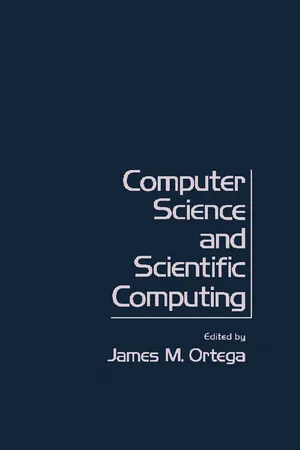
Computer Science and Scientific Computing
Proceedings of the Third ICASE Conference on Scientific Computing, Williamsburg, Virginia, April 1 and 2, 1976
- 316 pages
- English
- PDF
- Available on iOS & Android
Computer Science and Scientific Computing
Proceedings of the Third ICASE Conference on Scientific Computing, Williamsburg, Virginia, April 1 and 2, 1976
About This Book
Computer Science and Scientific Computing contains the proceedings of the Third ICASE Conference on Scientific Computing held in Williamsburg, Virginia, on April l and 2, 1976, under the auspices of the Institute for Computer Applications in Systems Engineering at the NASA Langley Research Center. The conference provided a forum for reviewing all the aspects of scientific computing and covered topics ranging from computer-aided design (CAD) and computer science technology to the design of large hydrodynamics codes. Case studies in reliable computing are also presented. Comprised of 13 chapters, this book begins with an introduction to the use of the hierarchical family concept in the development of scientific programming systems. The discussion then turns to the data structures of scientific computing and their representation and management; some important CAD capabilities required to support aerospace design in the areas of interactive support, information management, and computer hardware advances as well as some computer science developments which may contribute significantly to making such capabilities possible; and the use of symbolic computation systems for problem solving in scientific research. Subsequent chapters deal with computer applications in astrophysics; the possibility of computing turbulence and numerical wind tunnels; and the basis for a general-purpose program for finite element analysis. Software tools for computer graphics are also considered. This monograph will be of value to scientists, systems designers and engineers, and students in computer science who have an interest in the subject of scientific computing.
Frequently asked questions
Information
Table of contents
- Front Cover
- Computer Science and Scientific Computing
- Copyright Page
- Table of Contents
- Contributors
- Preface
- CHAPTER 1. LANGUAGE AS A TOOL FOR SCIENTIFIC PROGRAMMING
- CHAPTER 2. DATA DEFINITION, STRUCTURES, AND MANAGEMENT IN SCIENTIFIC COMPUTING
- CHAPTER 3. COMPUTER-AIDED DESIGN AND COMPUTER SCIENCE TECHNOLOGY
- CHAPTER 4. SCIENTIFIC APPLICATIONS OF SYMBOLIC COMPUTATION
- CHAPTER 5. THE ASTROPHYSICIST AND THE COMPUTER
- CHAPTER 6. TURBULENCE AND NUMERICAL WIND TUNNELS
- CHAPTER 7. GENERAL PURPOSE PROGRAM FOR FINITE ELEMENT ANALYSIS SOME COMPUTATIONAL CONSIDERATIONS
- CHAPTER 8. CASE STUDIES IN RELIABLE COMPUTING
- CHAPTER 9. DESIGN OF LARGE HYDRODYNAMICS CODES
- CHAPTER 10. SOFTWARE TOOLS FOR COMPUTER GRAPHICS
- CHAPTER 11. COMPUTERS AND QUANTUM CHEMISTRY
- CHAPTER 12. COMPUTER ARCHITECTURE IN THE 1980s
- CHAPTER 13. MINICOMPUTER COMPLEXES: PROGRESS AND PROSPECTS